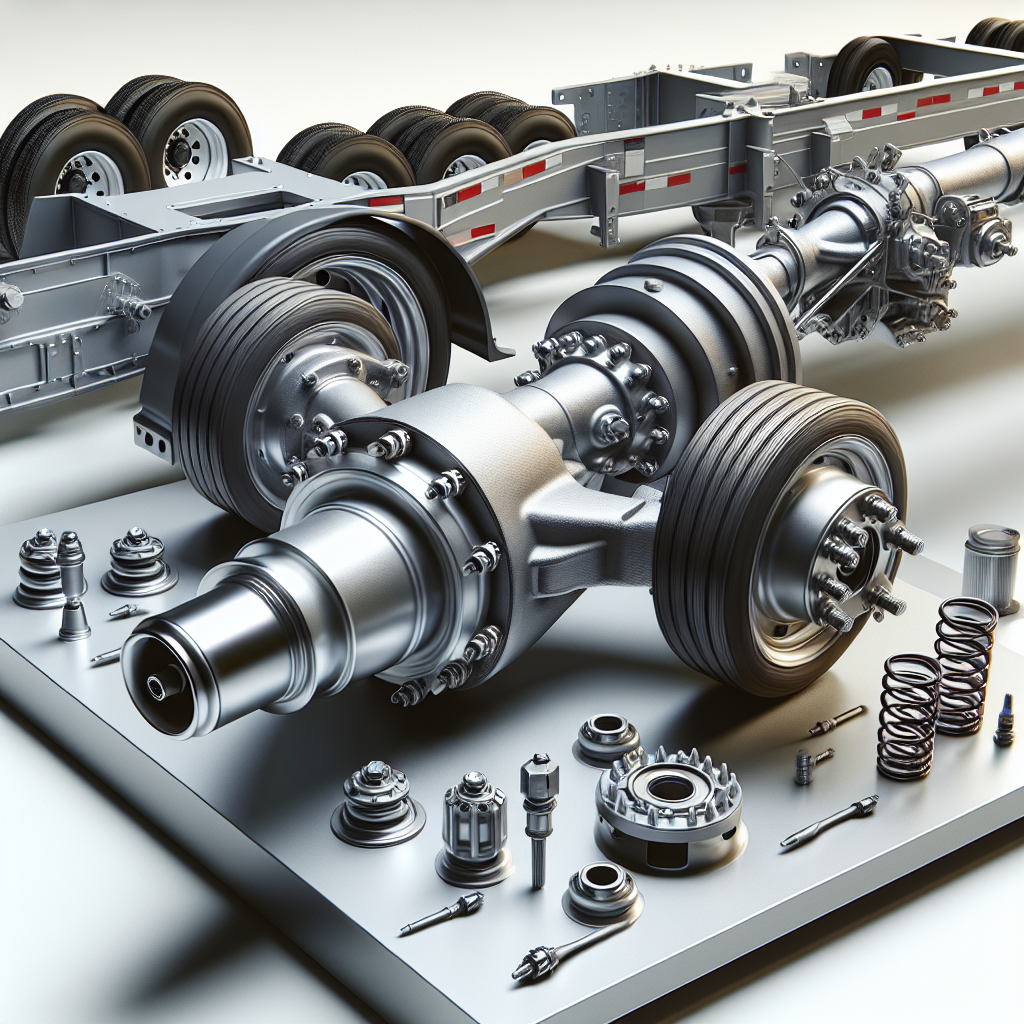

When it comes to understanding how trailer axles work, it's essential to first grasp their fundamental role in the overall performance and safety of a trailer. The trailer axle is a crucial component that connects the wheels and supports the weight of the trailer, ensuring a smooth ride and stability while towing.
Trailer axles come in various configurations, including single, tandem, and tri-axle setups, each designed to cater to different towing needs. These axles not only bear the load but also play a pivotal role in distributing weight evenly across the trailer. This balance is vital for maintaining control and preventing issues like swaying or fishtailing, which can occur when a trailer is improperly loaded.
Moreover, the functionality of a trailer axle extends beyond mere support. It facilitates the rotation of the wheels, allowing for effective maneuvering and optimizing the trailer's overall performance. Understanding the mechanics of trailer axles can help trailer owners make informed decisions regarding maintenance and upgrades, ultimately enhancing their towing experience.
To further safeguard your trailer's performance, consider utilizing advanced monitoring systems. Tow with peace of mind, knowing that trailerwatchdog is standing guard. Visit trailerwatchdog.com to learn more about our innovative solutions that keep your trailer safe and functional.
Understanding the Components of Trailer Axles

To fully appreciate how trailer axles work, it is crucial to understand the various components that make up these vital structures. A typical trailer axle consists of several key parts, each serving a specific purpose that contributes to the overall functionality and safety of the trailer.
- Axle Beam: The axle beam is the main body of the axle, providing the structural strength necessary to support the weight of the trailer. It connects the wheels and is designed to withstand torsional forces during towing.
- Spindles: Spindles are attached to the ends of the axle beam and hold the wheel hubs. They are critical for facilitating wheel rotation and are often designed to accommodate brake assemblies.
- Wheel Hubs: The wheel hubs are mounted onto the spindles and house the wheel bearings. These hubs allow for smooth rotation of the wheels while bearing the load of the trailer.
- Suspension System: A trailer axle is often equipped with a suspension system that absorbs shocks and impacts from the road, ensuring a smoother ride. Common types include leaf springs and torsion axles.
- Braking System: Many trailers feature a braking system integrated with the axle, which may include electric or hydraulic brakes. This system is essential for safely slowing down or stopping the trailer.
Each of these components plays a significant role in the operation of trailer axles, contributing to their performance and durability. Understanding these parts can help trailer owners recognize potential issues and ensure their trailers are maintained for safe towing.
How Trailer Axles Provide Stability and Control

Trailer axles are not just essential for supporting the weight of the trailer; they also play a critical role in providing stability and control while towing. The design and functionality of trailer axles ensure that the trailer remains balanced and maneuverable, which is vital for safety on the road.
One of the primary ways trailer axles contribute to stability is through their weight distribution. Properly positioned axles help evenly distribute the weight of the load across the trailer, preventing swaying and enhancing control during turns. This is especially important for larger trailers, where improper weight distribution can lead to dangerous handling characteristics.
Additionally, the track width of the axle—the distance between the wheels—affects the trailer's stability. A wider track width generally leads to improved stability by lowering the center of gravity and reducing the likelihood of tipping during sharp turns or sudden maneuvers.
The suspension system integrated with the trailer axle further enhances stability. By absorbing road shocks and vibrations, the suspension helps maintain consistent contact between the trailer wheels and the road surface, improving traction and control. This is particularly beneficial when traversing uneven terrain or navigating through inclement weather conditions.
In summary, the design and components of trailer axles are intricately linked to the overall stability and control of the trailer. A well-functioning axle system is paramount for ensuring safe towing experiences, making it essential for trailer owners to understand and maintain their axle systems.
Importance of Proper Maintenance for Trailer Axles

Proper maintenance of trailer axles is crucial for ensuring the longevity and safety of any trailer. Neglecting axle maintenance can lead to a myriad of problems that not only jeopardize the trailer's functionality but also pose significant safety risks while on the road.
One of the primary reasons to maintain trailer axles is to prevent premature wear and tear. Over time, components such as wheel bearings, seals, and bushings can deteriorate, leading to costly repairs or even complete axle failure. Regular inspections can help identify signs of wear early, allowing for timely replacements and adjustments.
Lubrication is another critical aspect of axle maintenance. Axles require adequate lubrication to function efficiently and to minimize friction. Without proper lubrication, the heat generated can cause parts to warp or seize, leading to catastrophic failures during operation. Regularly checking and replenishing lubricant levels is essential for smooth axle operation.
Furthermore, maintaining proper alignment is vital for the performance of trailer axles. Misalignment can lead to uneven tire wear, increased rolling resistance, and compromised stability while towing. Regular alignment checks ensure that the axles are positioned correctly, enhancing overall handling and safety.
Protect your trailer
Lastly, keeping an eye on brake systems that are often integrated with the axles is important. Worn-out brake components can lead to reduced stopping power and increased stopping distances, which can be dangerous in emergency situations. Ensuring that brakes are regularly inspected and maintained can significantly enhance safety.
In summary, proper maintenance of trailer axles is essential for ensuring safe towing, optimizing performance, and extending the lifespan of the trailer. Engaging in routine checks and maintenance practices can prevent unforeseen issues and enhance the overall towing experience.
Common Issues with Trailer Axles and Solutions

Trailer axles, while robust, can encounter a variety of issues that may compromise their performance and safety. Understanding these common problems and their solutions is essential for any trailer owner looking to maintain their vehicle's integrity.
One frequent issue is bearing failure. Bearings are critical for reducing friction between moving parts, and when they fail, it can lead to severe consequences, including axle damage. Regularly inspecting and replacing bearings, as well as ensuring proper lubrication, can help prevent such failures.
Another common problem is brake issues. Worn or malfunctioning brakes can lead to reduced stopping power, making it difficult to safely control the trailer. Regularly inspecting brake pads, rotors, and hydraulic systems can ensure that braking systems are functioning optimally, enhancing safety during travel.
Misalignment is also a prevalent issue with trailer axles. Misalignment can cause uneven tire wear and affect handling. Conducting regular alignment checks and adjustments can minimize tire wear and improve driving performance. If you notice your trailer pulling to one side or uneven tire wear, it may be time for an alignment check.
Additionally, rust and corrosion can significantly impact trailer axles, especially in areas exposed to moisture and road salt. Regular cleaning and applying protective coatings can help prevent rust formation. If rust is already present, it is crucial to address it promptly to avoid further damage.
Finally, tire-related issues, such as blowouts or uneven wear, are often linked to axle problems. Ensuring proper tire pressure, regularly checking tread depth, and rotating tires can mitigate these issues. When tires are in good condition, they support the axle system more effectively, reducing stress on the components.
Innovations in Trailer Axle Technology for Safety
As the demand for safer and more efficient trailers continues to grow, innovations in trailer axle technology are leading the charge in enhancing safety features. Modern advancements aim to reduce the risk of failure and improve the overall performance of trailers on the road.
One of the most significant innovations is the introduction of smart axle systems. These systems integrate sensors that monitor critical parameters such as temperature, load, and wheel speed. By collecting real-time data, smart axles can alert drivers to potential issues before they escalate into catastrophic failures. This proactive approach significantly enhances safety, allowing for timely maintenance and repairs.
Another exciting development is the use of advanced materials. Manufacturers are now utilizing lightweight, high-strength materials such as aluminum alloys and composites that not only reduce the overall weight of the trailer but also improve durability. This advancement means that trailers can carry heavier loads without compromising safety.
Additionally, automated braking systems are becoming increasingly popular. These systems can engage the trailer's brakes automatically in the event of sudden stops or if the vehicle begins to sway, helping to maintain control and stability. This technology is particularly beneficial for novice drivers or those operating larger trailers.
Furthermore, anti-lock braking systems (ABS) are being integrated into trailer axles to prevent wheel lockup during braking. This feature enhances vehicle control and reduces stopping distances, making trailers safer on various road conditions.
As trailer technology evolves, so does the importance of monitoring systems that provide real-time feedback on axle performance. With systems like TrailerWatchdog, trailer owners can tow with peace of mind, knowing that their trailers are equipped with cutting-edge technology designed to prevent failures and enhance safety.




